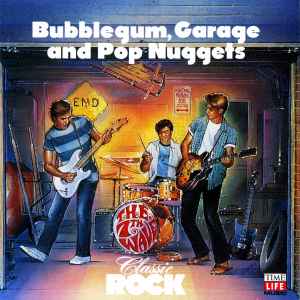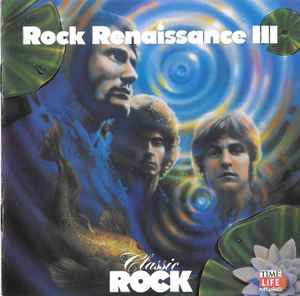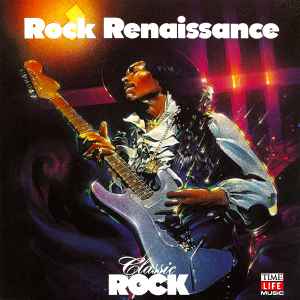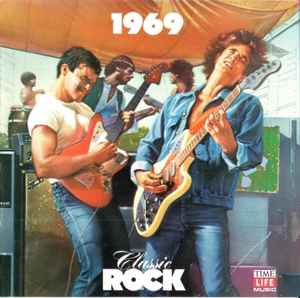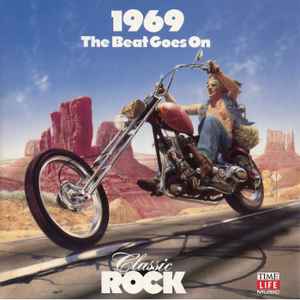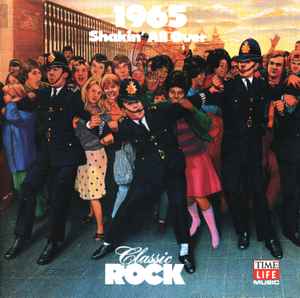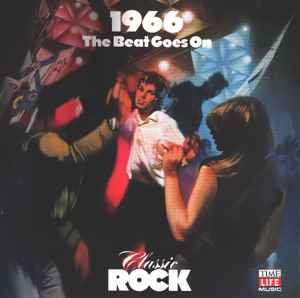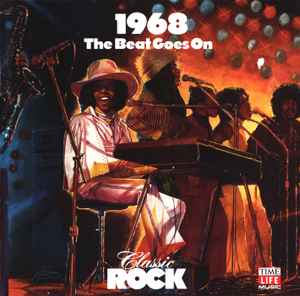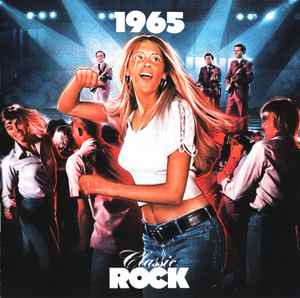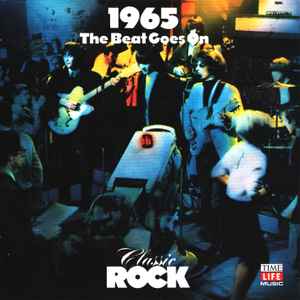Various – Bubblegum, Garage And Pop Nuggets
| Label: | Time Life Music – 2CLR-29, Warner Special Products – OPCD-2626 |
|---|---|
| Series: | Classic Rock (2) – 29 |
| Format: | CD, Compilation, Remastered |
| Country: | US |
| Released: | |
| Genre: | Rock, Pop |
| Style: | Surf, Rock & Roll, Pop Rock, Psychedelic Rock, Bubblegum, Sunshine Pop, Garage Rock |
Tracklist
| 1 | Gary Lewis And The Playboys*– | Everybody Loves A Clown | 2:26 |
| 2 | Sopwith Camel– | Hello Hello | 2:28 |
| 3 | The Mojo Men– | Sit Down, I Think I Love You | 2:22 |
| 4 | The Lovin' Spoonful– | Rain On The Roof | 2:15 |
| 5 | The Tremeloes– | Silence Is Golden | 3:10 |
| 6 | The Critters– | Mr. Dieingly Sad | 2:50 |
| 7 | The Gants– | Road Runner | 2:21 |
| 8 | The Knickerbockers– | One Track Mind | 2:23 |
| 9 | The Shadows Of Knight– | Shake | 2:30 |
| 10 | The Third Rail– | Run, Run, Run | 2:00 |
| 11 | The Nightcrawlers– | The Little Black Egg | 3:02 |
| 12 | Crazy Elephant– | Gimme Gimme Good Lovin' | 2:04 |
| 13 | 1910 Fruitgum Company– | Indian Giver | 2:43 |
| 14 | Tommy James And The Shondells*– | Say I Am (What I Am) | 2:32 |
| 15 | The Parade (2)– | Sunshine Girl | 2:42 |
| 16 | The Sunrays– | I Live For The Sun | 2:29 |
| 17 | The Lemon Pipers– | Rice Is Nice | 2:20 |
| 18 | The Woolies– | Who Do You Love | 2:04 |
| 19 | The Sunshine Company– | Back On The Street Again | 2:30 |
| 20 | The Merry-Go-Round– | Live | 2:36 |
| 21 | The Peanut Butter Conspiracy– | It's A Happening Thing | 2:26 |
| 22 | The Flying Machine– | Smile A Little Smile For Me | 2:56 |
Companies, etc.
- Record Company – Time Inc.
- Record Company – Time Warner
- Phonographic Copyright ℗ – Warner Special Products
- Copyright © – Time-life Books Inc.
- Manufactured For – Time Life Music
- Manufactured By – Warner Special Products
- Remastered At – Hit And Run Studios
- Mastered At – Trutone Mastering Labs
- Glass Mastered At – Specialty Records Corporation
Credits
- Artwork [Art Studio] – Nina Bridges
- Compilation Producer [Recording Producer], Consultant [Series Consultant] – Joe Sasfy
- Cover – Steve Chorney*
- Creative Director – Robin Bray
- Executive-Producer – Charles McCardell
- Management [Chairman] – Paul R. Stewart
- Management [Chief Financial Officer] – Eric R. Eaton
- Management [President] – John Hall (14)
- Management [Vice President] – Fernando Pargas
- Producer [Associate], Author – Robert Hull
- Production Manager – Karen Hill (4)
- Remastered By [Recording Producer] – Steve Carr
Notes
Volume 29 of a 30 volume set.
Track durations obtained from software.
Booklet credit:
CD mastering by Trutone Records, Haworth, N.J.
Complete liner notes:
From 1965 through 1969, the pop music made in America was a glorious mess. There was no telling what might blast forth from the AM radio. Outside of R & B, country and adult schlock, most American pop that charted was created in teenagers' garages or producers' studios. Hindsight has given us labels for most of this stuff - psychedelia, garage-punk, bubblegum - but at the time, the music was surprising, and even today it holds a sense of mystery.
Garage music developed between 1959 and 1962, heyday of instrumental bands. From the Pacific Northwest came the first significant garage record: Louie Louie by the Kingsmen. It was punk incarnate, a brawl with bodies and cymbals crashing, and it inspired untold numbers of teenage bands all across America.
In the Midwest, the Woolies from East Lansing, Michigan, got their start in the summer of 1966 at a competition at the Michigan State Fair. The group won a trip to L.A. and met Lou Adler, the West Coast's archetypal '60s producer (Johnny Rivers, the Mamas and the Papas). The Woolies cut a version of Bo Diddley's Who Do You Love with lead singer Stormy Rice. But Adler's label. Dunhill, promoted the B side, and the record died, having barely entered the Top 100.
In the South, the sound and the fury of garage music was crudely present in songs by the Swingin' Medallions, the Gentrys, the Hombres and the Uniques, all of whom saw some chart action. Perhaps the most primitive of Southern garage groups was the Gants, named after a popular brand of preppy sport shirts, who began as a fraternity band at Mississippi State University. Like the Woolies, the Gants were drawn to Bo Diddley material, and for their first single they recorded a tough version of Road Runner. Some radio listeners probably believed the record, released in 1965 at the height of the British Invasion, was another English group covering an American R & B song.
Sounding British was the ploy of many garage bands in the mid-'60s who hoped that the public would regard them as the next Beatles. No Beatles sound-alikes had as much success as the Knickerbockers from Bergenfield, New Jersey. They first hit in early 1966 with Lies, which went Top 20 perhaps because it sounded exactly like the Beatles. By the time the band released its sequel, One Track Mind, the public had wised up and the record narrowly escaped the Top 40. Nevertheless, the Knickerbockers begat a trend: in supermarkets all over America cut-rate record companies sold phony Beatle albums by groups with names like the Buggs and the Merseyboys.
In 1966, while garage music was hitting the national charts, bands were already being influenced by the psychedelic vision. Many punk groups were walking the fine line between the fuzz tone and the strobe light, among them the Nightcrawlers from Daytona Beach, Florida. In September 1965, a local label released the group's The Little Black Egg, a strange tale about an egg found in a tree. The song was minimalism at its finest, as catchy and as mysterious as Louie Louie, and it became one of the first regional records to enter the Florida charts as well as a staple for aspiring area garage bands. The Kapp label released it nationally in 1966 and the following year put out a collection of the band's singles with a psychedelic black egg on the cover. But it was already too late - the band had ceased to exist.
Psychedelic music was conceived as a reaction to the teenage fandom of garage music and the British Invasion, and it reached a zenith of seriousness with bands such as the Grateful Dead. But the genre had a studio-pop side as well. Based in San Francisco, the Mojo Men were one of the few groups who surfaced before the city's psychedelic cloud mushroomed and weren't pushed aside once it had vanished. The quartet recorded a few early singles for Sly (Stewart) Stone's Autumn label. The all-male group added a female vocalist, Jan Ashton, from the Vejtables, another San Francisco group on Autumn. Her gorgeous singing on the Mojo Men's premiere single for a major label, Sit Down, I Think I Love You, helped to place the record in the Top 40. The fact that the song was a Stephen Stills composition from the then-popular Buffalo Springfield's debut album didn't hurt either.
Named after a famous World War I airplane, Sopwith Camel hailed from San Francisco but had nothing in common with the heavy acid-rock bands of that scene. The quintet's producer, Erik Jacobsen. had created seven consecutive top-10 hits, including Rain on the Roof, for the Lovin' Spoonful, the kings of good-timey rock 'n' roll. The Camel's only hit, Hello Hello, had a quaint sound with lead vocalist Peter Kraemer singing in the lilting manner of the Spoonful's John Sebastian. "So relaxed they could make the Spoonful sound uptight," was one critical comment. The same could have been said about the Critters, a soft-pop New Jersey quintet who had a modest hit in 1966 with Sebastian's Younger Girl from the Spoonful's 1965 debut LP. The Critters' follow-up, Mr. Dieingly Sad, was also done in a modified Spoonful style and entered the Top 20.
Also in pursuit of that happy sound was the Sunshine Company, a California candy-floss group that began as a boy-girl duo. Their first single, Happy, established them in the vein of Spanky and Our Gang and the Mamas and the Papas. (Clairol even used the sunny song in commercials for its hair products.) The group's follow-up, Back on the Street Again, was more good day-sunshine fluff and their only hit.
Psychedelia ended almost as quickly as it began. British bands such as Pink Floyd and Cream were providing competition in the acid-rock arena. What's more, the San Francisco scene had become overexposed - Monterey Pop was a household word and Scott McKenzie preached floral salvation. The death knell of this visionary style was probably sounded by the Peanut Butter Conspiracy, a California band with a commercial blend of blues, rock and raga. The title of the band's first album was the slogan they used to sell their image: The Peanut Buller Conspiracy Is Spreading. Their pop single, It's a Happening Thing, let the world know that they knew where it was at: unfortunately, the song barely entered the charts. Following in their footsteps were numerous acid-rock casualties with silly names - the Leathercoated Minds, the Mesmerizing Eye, Lothar and the Hand People. Finally, on October 6, 1967, a hippie effigy was buried on Haight Street in San Francisco.
As the '60s waned, the mainstream that the psychedelic style had originally rebelled against - studio artifice and bubblegum pop - not only adopted the acid approach but became the dominant sound. In early 1966, a Long Island pair of studio magicians, Jerry Kasenetz and Jeff Katz, released their first Super K production. When the team joined Neil Bogart's Buddah label late in 1967, true bubblegum music was born. The highlights of Kasenetz-Katz's production work were practically all chart hits. The 1910 Fruitgum Company's Indian Giver, a top-10 record in 1969, was actually made by session musicians
and featured the lead singing of writer-producer Joey Levine. Two years earlier, Levine had constructed a group called the Third Rail with songwriters Artie Resnick and his wife, Kris, which hit with Run, Run, Run, a socially significant exercise in pop psychedelia. Levine and Resnick also wrote and produced the Super K monster Shake by the Shadows of Knight, formerly a garage band from Chicago who'd made the top 10 in 1966 with a cover of Van Morrison's Gloria. The last great Kasenetz-Katz classic (again written and produced by Levine) was undoubtedly Crazy Elephant's Gimme Gimme Good Lovin', which hit in 1969 just before bubblegum's transformation into the cartoon aesthetics of the Archies.
There was even psychedelic-bubblegum rock. Originally known as Ivan and the Sabres, Cincinnati's Lemon Pipers hit No. 1 in 1968 on Kasenetz-Katz's Buddah label with Green Tambourine. Unlike the Super K collective of studio musicians, however, the Lemon Pipers were a real band. But their appeal was largely as a novelty - as practitioners of a new hybrid genre - and their follow-up, Rice Is Nice, did not reach the Top 40. Their last known single, Jelly Jungle (Of Orange Marmalade) - perhaps because of the song's title and its gelatinous imagery - did even worse.
- Robert Hull
Track durations obtained from software.
Booklet credit:
CD mastering by Trutone Records, Haworth, N.J.
Complete liner notes:
From 1965 through 1969, the pop music made in America was a glorious mess. There was no telling what might blast forth from the AM radio. Outside of R & B, country and adult schlock, most American pop that charted was created in teenagers' garages or producers' studios. Hindsight has given us labels for most of this stuff - psychedelia, garage-punk, bubblegum - but at the time, the music was surprising, and even today it holds a sense of mystery.
Garage music developed between 1959 and 1962, heyday of instrumental bands. From the Pacific Northwest came the first significant garage record: Louie Louie by the Kingsmen. It was punk incarnate, a brawl with bodies and cymbals crashing, and it inspired untold numbers of teenage bands all across America.
In the Midwest, the Woolies from East Lansing, Michigan, got their start in the summer of 1966 at a competition at the Michigan State Fair. The group won a trip to L.A. and met Lou Adler, the West Coast's archetypal '60s producer (Johnny Rivers, the Mamas and the Papas). The Woolies cut a version of Bo Diddley's Who Do You Love with lead singer Stormy Rice. But Adler's label. Dunhill, promoted the B side, and the record died, having barely entered the Top 100.
In the South, the sound and the fury of garage music was crudely present in songs by the Swingin' Medallions, the Gentrys, the Hombres and the Uniques, all of whom saw some chart action. Perhaps the most primitive of Southern garage groups was the Gants, named after a popular brand of preppy sport shirts, who began as a fraternity band at Mississippi State University. Like the Woolies, the Gants were drawn to Bo Diddley material, and for their first single they recorded a tough version of Road Runner. Some radio listeners probably believed the record, released in 1965 at the height of the British Invasion, was another English group covering an American R & B song.
Sounding British was the ploy of many garage bands in the mid-'60s who hoped that the public would regard them as the next Beatles. No Beatles sound-alikes had as much success as the Knickerbockers from Bergenfield, New Jersey. They first hit in early 1966 with Lies, which went Top 20 perhaps because it sounded exactly like the Beatles. By the time the band released its sequel, One Track Mind, the public had wised up and the record narrowly escaped the Top 40. Nevertheless, the Knickerbockers begat a trend: in supermarkets all over America cut-rate record companies sold phony Beatle albums by groups with names like the Buggs and the Merseyboys.
In 1966, while garage music was hitting the national charts, bands were already being influenced by the psychedelic vision. Many punk groups were walking the fine line between the fuzz tone and the strobe light, among them the Nightcrawlers from Daytona Beach, Florida. In September 1965, a local label released the group's The Little Black Egg, a strange tale about an egg found in a tree. The song was minimalism at its finest, as catchy and as mysterious as Louie Louie, and it became one of the first regional records to enter the Florida charts as well as a staple for aspiring area garage bands. The Kapp label released it nationally in 1966 and the following year put out a collection of the band's singles with a psychedelic black egg on the cover. But it was already too late - the band had ceased to exist.
Psychedelic music was conceived as a reaction to the teenage fandom of garage music and the British Invasion, and it reached a zenith of seriousness with bands such as the Grateful Dead. But the genre had a studio-pop side as well. Based in San Francisco, the Mojo Men were one of the few groups who surfaced before the city's psychedelic cloud mushroomed and weren't pushed aside once it had vanished. The quartet recorded a few early singles for Sly (Stewart) Stone's Autumn label. The all-male group added a female vocalist, Jan Ashton, from the Vejtables, another San Francisco group on Autumn. Her gorgeous singing on the Mojo Men's premiere single for a major label, Sit Down, I Think I Love You, helped to place the record in the Top 40. The fact that the song was a Stephen Stills composition from the then-popular Buffalo Springfield's debut album didn't hurt either.
Named after a famous World War I airplane, Sopwith Camel hailed from San Francisco but had nothing in common with the heavy acid-rock bands of that scene. The quintet's producer, Erik Jacobsen. had created seven consecutive top-10 hits, including Rain on the Roof, for the Lovin' Spoonful, the kings of good-timey rock 'n' roll. The Camel's only hit, Hello Hello, had a quaint sound with lead vocalist Peter Kraemer singing in the lilting manner of the Spoonful's John Sebastian. "So relaxed they could make the Spoonful sound uptight," was one critical comment. The same could have been said about the Critters, a soft-pop New Jersey quintet who had a modest hit in 1966 with Sebastian's Younger Girl from the Spoonful's 1965 debut LP. The Critters' follow-up, Mr. Dieingly Sad, was also done in a modified Spoonful style and entered the Top 20.
Also in pursuit of that happy sound was the Sunshine Company, a California candy-floss group that began as a boy-girl duo. Their first single, Happy, established them in the vein of Spanky and Our Gang and the Mamas and the Papas. (Clairol even used the sunny song in commercials for its hair products.) The group's follow-up, Back on the Street Again, was more good day-sunshine fluff and their only hit.
Psychedelia ended almost as quickly as it began. British bands such as Pink Floyd and Cream were providing competition in the acid-rock arena. What's more, the San Francisco scene had become overexposed - Monterey Pop was a household word and Scott McKenzie preached floral salvation. The death knell of this visionary style was probably sounded by the Peanut Butter Conspiracy, a California band with a commercial blend of blues, rock and raga. The title of the band's first album was the slogan they used to sell their image: The Peanut Buller Conspiracy Is Spreading. Their pop single, It's a Happening Thing, let the world know that they knew where it was at: unfortunately, the song barely entered the charts. Following in their footsteps were numerous acid-rock casualties with silly names - the Leathercoated Minds, the Mesmerizing Eye, Lothar and the Hand People. Finally, on October 6, 1967, a hippie effigy was buried on Haight Street in San Francisco.
As the '60s waned, the mainstream that the psychedelic style had originally rebelled against - studio artifice and bubblegum pop - not only adopted the acid approach but became the dominant sound. In early 1966, a Long Island pair of studio magicians, Jerry Kasenetz and Jeff Katz, released their first Super K production. When the team joined Neil Bogart's Buddah label late in 1967, true bubblegum music was born. The highlights of Kasenetz-Katz's production work were practically all chart hits. The 1910 Fruitgum Company's Indian Giver, a top-10 record in 1969, was actually made by session musicians
and featured the lead singing of writer-producer Joey Levine. Two years earlier, Levine had constructed a group called the Third Rail with songwriters Artie Resnick and his wife, Kris, which hit with Run, Run, Run, a socially significant exercise in pop psychedelia. Levine and Resnick also wrote and produced the Super K monster Shake by the Shadows of Knight, formerly a garage band from Chicago who'd made the top 10 in 1966 with a cover of Van Morrison's Gloria. The last great Kasenetz-Katz classic (again written and produced by Levine) was undoubtedly Crazy Elephant's Gimme Gimme Good Lovin', which hit in 1969 just before bubblegum's transformation into the cartoon aesthetics of the Archies.
There was even psychedelic-bubblegum rock. Originally known as Ivan and the Sabres, Cincinnati's Lemon Pipers hit No. 1 in 1968 on Kasenetz-Katz's Buddah label with Green Tambourine. Unlike the Super K collective of studio musicians, however, the Lemon Pipers were a real band. But their appeal was largely as a novelty - as practitioners of a new hybrid genre - and their follow-up, Rice Is Nice, did not reach the Top 40. Their last known single, Jelly Jungle (Of Orange Marmalade) - perhaps because of the song's title and its gelatinous imagery - did even worse.
- Robert Hull
Barcode and Other Identifiers
- Matrix / Runout: 10 OPCD 2626-2 SRC=01 M2S6
Other Versions (3)
View All| Title (Format) | Label | Cat# | Country | Year | |||
|---|---|---|---|---|---|---|---|
Recently Edited | Classic Rock - Bubblegum, Garage And Pop Nuggets (2×LP, Compilation) | Time Life Music, Warner Special Products | SCLR-29, OPCD-2626 | US | 1991 | ||
New Submission | Classic Rock - Bubblegum, Garage And Pop Nuggets (Cassette, Compilation, Dolby, SR Pressing) | Time Life Music, Warner Special Products | 4CLR-29, OPCS-2626 | US | 1991 | ||
New Submission | Bubblegum, Garage And Pop Nuggets (CD, Compilation, Remastered, Repress) | Time Life Music, Warner Special Products | 2CLR-29, OPCD-2626 | US | Unknown |
Recommendations
- Released1990 — USCD —Compilation
- Released1988 — USCD —Compilation
- Released1989 — USCD —Compilation
- Released1988 — USCD —Compilation
- Released1989 — USCD —Compilation
- Released1989 — USCD —Compilation
- Released1988 — USCD —Compilation
- Released1989 — USCD —Compilation
- Released1987 — USCD —Compilation
- Released1988 — USCD —Compilation
Reviews
Release
For sale on Discogs
Sell a copy2 copies from 16,25 $US
